- Home
- Kate Quinn
Ribbons of Scarlet Page 6
Ribbons of Scarlet Read online
Page 6
All while I said my vows to another man.
“I, Marie-Louise Sophie de Grouchy, take thee, Marie-Jean-Antoine-Nicolas de Caritat, the Marquis de Condorcet . . .”
I paid little attention to the promises we made beneath pine boughs and holly berries. I believed they meant nothing. Our first kiss was a peck; I’m ashamed to say I scarcely remember it. More ashamed that I remember vividly how Lafayette kissed my cheeks. “Congratulations to the rosy bride, Marquise de Condorcet!”
Yet there was some grace in that the first kisses I received from Lafayette were given while he called me by another man’s name and title. It was a reminder that while I had no choice whatsoever in the ridiculous humiliations of love, I’d had a choice in marriage. And I knew I had made the right choice.
Especially that night when, alone in our bridal chamber—for I would not allow servants to undress us—Condorcet frowned. “I fear I misstepped in inviting Lafayette to the wedding and made you unhappy.”
“No, of course not, I—”
“Let us always be honest.”
Swallowing, I tried. “It’s a pang that will pass. In fact, I think it has already passed.” Something eased in me. “Please forgive me.”
“There’s nothing to forgive,” Condorcet said, removing his coat and throwing it over the end of the divan, making as if ready to sleep there. This seemed faintly silly as we’d already shared physical congress, but he didn’t presume it was his right. Even on this night.
“Sophie—may I call you Sophie?” When I nodded, he continued, “And I would like it if you called me Nicolas.”
“Yes, of course.”
“Sophie, it will only work between us if you have freedom to love what you admire. If that is Lafayette, then go to him. I won’t stop you. You’re not bound. And regardless of whether you wish to go to him tonight, if you regret this marriage, you may press for an annulment. I won’t contest it.”
He said this with the utmost sincerity, and a truth stole over me that lightened my spirit even more. I had married an extraordinary man. “Even I am not so irreverent a creature as to attempt adultery on my wedding night, and I’ve no regret, other than causing you unease.”
He smiled. “To the contrary, madame, you’ve made me happier than I’ve ever been.”
I slanted him an amused glance. “I fear you’ve a low threshold for happiness.”
“Perhaps. But now we’re done with rituals, the worst outcome can only be that we live separately and give each other no trouble for the rest of our days.”
I blinked. “I assumed you wished for me to live with you.”
“I do,” he replied. “Very much so. But what do you wish?”
Was he suggesting I might continue here in Villette with my family? Or live at his ancestral estate? Or even take a separate residence in Paris? The options—options I never expected—were dizzying. And his willingness to give me options warmed my heart and lodged a little lump of gratitude in my throat. “I see no reason to complicate things. I should like to live with you in Paris.”
“Thus making me even happier,” Condorcet replied, snuffing out the candle so we were plunged into darkness.
Me in my bed, he upon the divan.
I was so tired that I ought to have faded to sleep. But instead, I asked across the dark divide, “How did you come to be different from other men?”
“I’m no different,” he said.
He was wrong. Men might be born with the same natural rights, but not the same natural endowments. Or the same personalities. “I feel as if you somehow know just what a woman might need to hear to make her happy.”
He laughed. “I assure you, madame, you are the first person to ever accuse me of that.” Then he laughed again.
He had a wonderful laugh. Rich and sonorous. I realized I’d never heard it before. And I hoped the fact I desired to hear it more frequently meant we’d get on well together.
* * *
Paris, January 1787
On the day we arrived at Condorcet’s residence, I admired a portrait in the hall, my fingers itching to reproduce it in a sketch. “Who is this darling little girl? A relation of yours?”
Unexpectedly, the question made my new husband cringe. “In a way.”
His reaction made my stomach knot. Was this a bastard daughter? Given our arrangement, it wasn’t my right to know, but my voice was sharp. “In what way?”
He glanced at me warily. “My mother was a good woman. A loving mother . . . but she kept me in dresses almost until the age of eight. Years after other boys were breeched and began to attend school. That portrait is not a girl. It’s me. You can, perhaps, easily imagine the cruel laughter and mockery of other boys that I endured.”
Sensing a lingering pain, I took the liberty of reaching for his hand. “We should be rid of this portrait if it humiliates you.”
“No, it educates me,” he said, squeezing my fingers. “That’s a good thing. The experience taught me the indignities to which girls are subjected. It taught me to sympathize.”
Sympathy.
We had that between us, at least.
And that was the start of everything good in this world.
I soon found it easy to be married to Condorcet, who left me to be entirely my own mistress. No one scolded me if I stayed abed all day or read legal books into the wee hours trying to find something useful for my uncle’s case. No one told me which wig I must wear to social outings. Nor did anyone stop me from strolling the nearby Pont Neuf where I chatted pleasantly with a tart-tongued fruit seller named Louise who was convinced that nobles were hoarding all the grain and driving up the price of bread.
I had no mending to tend to, no children to look after, and no duties whatsoever. Which I found unexpectedly intolerable.
Freedom, I liked. Purposelessness, I couldn’t bear.
So while we awaited the appeal of my uncle’s case, I helped Condorcet translate pamphlets that interested him from English into French. That’s how I learned that my new husband’s work ranged from science to mathematics to economics to politics, philosophy, and the law. Such an astonishing intellect might have shut himself up amongst the safety of his books.
But I greatly admired the way Condorcet committed himself to public service. He was hard at work designing new schools, roads, hospitals, and canals—inventing a new kind of hydrodynamic science in the process. Such industry made it even more surprising how little he imposed upon his household staff, the latter of whom took advantage of his bachelor habits.
“It should go without saying,” he said, one morning in passing by my door, “that you have my support if you might like to bring about some changes here.”
“I would, actually,” I replied. “Starting with breakfast.”
“Breakfast?”
By unspoken agreement, we didn’t share the intimacy of a husband and wife, but I enjoyed his company and wished to take better care of him if he would not take better care of himself. “I should like for us to take breakfast together, if you don’t find that prospect disagreeable.”
“Not at all,” he replied. “It’s only that I never formed the habit . . . and neither has my cook . . .”
His cook, like all his servants, was woefully underemployed and if I was to host a salon—which I was keen to do—I’d have to find a way of changing that. Breakfast seemed like a good start. “A hearty omelet invigorates me and gives me hope for the new day. Perhaps it will have the same effect upon you.”
“Perhaps it will,” he said.
So began our morning ritual.
The cook’s first attempt, with too little butter and a sprinkling of bitter herbs, was unpleasant, though Condorcet ate without complaint as we discussed the news: that an Assembly of Notables was to meet to address the country’s debt.
Lafayette had been chosen as one of the notables. My new husband was less notable. And since we didn’t have to go to Versailles, we talked instead of plans to create a new public school for adults across fro
m the Palais-Royal. “I’ll teach mathematics,” he said. “Perhaps you might consider educating persons in literacy, philosophy, and what you know of the law.”
I quite nearly dropped my napkin. “You’d want me to teach?”
“Only if you wish. You’re among the most learned women I know, which is, of course, one of your most appealing qualities.” His flattering confidence was only slightly less breathtaking than his vision for the school itself. “And we’ll invite anyone who would like to learn.”
“Even Louise, the saucy fruit seller on the Pont Neuf? Her skirts are filthy but her eyes are bright.”
“Why not? She sounds as if she’d get on well with my new valet . . .”
“You’ve taken a valet?” This surprised me because I’d never met a nobleman less concerned with proper dress.
Condorcet nodded. “He’s being fitted for livery as we speak—if any can be made for a boy his size.”
“A boy?” I asked, even more confused.
Condorcet sat back with the utmost satisfaction. “The son of one of our three prisoners. I sent for him, with enough money to keep the family from starvation whilst the case works its way through appeals. He says to call him Pierre Simare . . .”
Tears pricked at my eyes, this gesture touching me deeply. “You rescued that boy, Nicolas. And if his father is pardoned, it will be your doing.”
“Your uncle is his true savior. And you.”
The way Condorcet looked at me in that moment made me wish I’d done more to be worthy of his esteem, because he was certainly worthy of mine. “Did you do this only to please me?”
“No,” he said. “But everything I do now carries with it that hope. For the chance of a day, or even an hour, that you might return my feelings in passionate harmony, I’d give years of my life.”
And here I’d thought him a scientist and not a poet . . .
He was so good and decent—I could see already many admirable traits in him that justified an answering in my heart beyond friendship. So why wouldn’t it come? Perhaps because love was ridiculous, it wasn’t possible with Condorcet. But I remembered a feverish moment in the tennis courts when I felt an intimacy with him. Now I wished to feel it again. “As we’re on the subject of education, sir, I’d like to take instruction from you . . .”
His eyes brightened. “I’d be happy to teach you hydrodynamics . . .”
“I’m more curious about biology.” When he showed no comprehension, I decided I must be more frank. “I want to learn the science of physical satisfaction and wonder if you’d consider visiting my chambers this evening for a less hurried lesson than we enjoyed in the tennis courts.”
Condorcet put down his fork. Picked his fork up again. Put his fork down. Then, at last, he lifted his gaze, crimson spreading up his neck as if he were a virgin maid. He started to say something. Then changed his mind. For a moment I thought he might actually refuse. Had I misunderstood his intentions for our arrangement?
Finally, a slow grin worked itself onto his face. “Why wait for this evening?”
Such unexpected waggishness made me laugh. But I didn’t like to be outdone in boldness, so when my laughter subsided, I asked, “For that matter, why bother with my chambers?”
That made him laugh. And as I’ve said, I loved to hear him laugh.
More than an hour later, we lay panting upon the Turkey carpet, one of the dishes broken, egg on the floor—neither of us could remember how that happened—and I felt as if I knew a great deal more about what satisfied appetites of the flesh. Condorcet had made an experiment of my body, and nearly everything he did with hot hands and fevered breath delighted me.
A volcano covered in snow, indeed . . .
But in the end, he again pulled away so as not to make a child, and that did not delight me. Still, the whole experience was pleasurable enough that I wished to repeat it. I hoped he would too. So I was gratified that though he groaned—the floor did nothing good for his aging back—he said, “I’m beginning to see the value in breakfast.”
THE STUDENTS AT our new school near the Palais-Royal called me Vénus Lycéenne. Or so Louise told me when I invited her to leave off her fruit-selling for an hour each day so that I might teach her to read.
Despite my marriage, or perhaps because of it, I’d received in Paris several offers from would-be paramours for illicit trysts. “Might as well let a man seduce you if you fancy him,” Louise said as we sipped cups of chocolate at La Maison du Chocolat Léon in Saint-Germain—a special treat for her that I wished to give so as to bolster her confidence. “Because I hear things in the market, and everyone is already saying that you’ve made your husband a cuckold with his friend Lafayette.”
“That’s malicious gossip,” I said, wondering for the thousandth time what I’d done to give rise to it and if such gossip was merely something women must endure. Still, I worried that Condorcet might overhear such whispers, and that—whatever our agreement—they might give him embarrassment.
I was resentful, too, that everyone seemed to have an opinion about our marriage, including my new student. “Seems an odd match, if you don’t mind my saying so. You’re young and vibrant, and the marquis is a terse old fellow.”
Most common fruit sellers wouldn’t dare to express something like that about their supposed social betters, but I’d encouraged Louise to speak her mind. Unfortunately, now I felt outraged on Condorcet’s behalf. It was true he was no good in public; with strangers he fidgeted and his fuse was short. But in a small circle of friends, he could weave a tapestry of predictions for the future that beguiled his listeners—rhapsodizing about how, through science and reason and harnessing the sun, the world could be made a utopia.
“He’s different in private,” I protested. “Extraordinarily charming, actually.”
“If you say so.” Louise raised a dubious brow as the chocolatier, Mademoiselle Léon, refilled our cups. “But if that nose of his ever makes you cringe, I s’pose you can console yourself with his money.”
“There’s nothing about Condorcet that makes me cringe,” I said, a little heatedly. “And I didn’t marry him for money. I married him for equality.”
At that, Mademoiselle Léon gave a little snort, nearly spilling her pot of chocolate. Meanwhile, Louise shrugged, smoothing her skirts, which, for once, and in honor of this outing, were clean, even if stained and in need of mending. “I’m just a fruit seller. But seems to me, you’re only as equal as he lets you be. Like the king, he could shut you up in a dungeon or a nunnery or abandon you to a brothel if he pleased.”
“He’d never do such a thing,” I replied. Really, where did she get these ideas?
Louise, who had lived a hard life fending for herself on the streets of Paris, broke into a toothy grin, as if she thought me a simpleton.
I might’ve forgotten this exchange, if, the next morning, our little valet hadn’t said to me, “When I get big, I’ll steal a kiss from you, madame. The Marquis de Condorcet is a kindly grandfather, but too old and ugly to make you happy for long.”
“When you get big, Pierre,” I said, ruffling the little wretch’s hair. “I hope you’ll know better than to steal anything. Even kisses.”
I liked Pierre—and I liked having the boy in our home, since we were unlikely to ever have children. A happenstance I should’ve considered more carefully from the outset. Still, Condorcet wasn’t old enough to be my grandfather. He could be addlebrained, losing pens and ink and mislaying his tobacco. But I counted that as a product of his brain at work with more important matters, not age.
Besides, he was in no way ugly, inside or out.
So I abandoned my sketches of men dying on wheels in favor of painting my husband’s portrait, determined to capture those moments when he smiled wryly from the side, his mouth caught between scholarly severity and good-natured amusement. Or the even rarer moments when he laughed. For I wished for the world to see him as I was beginning to see him, with very kindly eyes indeed.
* *
*
Versailles, August 1788
At long last, our three peasants of Chaumont were declared innocent and set free.
What’s more, the vengeful verdict against my uncle had been reversed too. I didn’t know if Madame Élisabeth had anything to do with it, but I flattered myself to think so. Certainly, Condorcet deserved much of the credit.
Victory was sweet and ought to have satisfied us, some said.
But before we could celebrate, we’d learned of another young man who was to be broken upon the wheel in Versailles, where no one believed him guilty of the crime for which he’d been accused. I hadn’t wanted my uncle to make this trip; he was feeling in poor health. I myself did not wish to witness another execution ever again. But we both believed that our presence there might somehow help matters, and Condorcet understood that it was something I felt I must do.
“It’s not even sunrise yet,” I murmured to my uncle when the prisoner’s cart rattled into the square. Yet if the executioner had hoped to be done with this deed before an angry crowd could gather, he was mistaken. For a multitude of men, ranging from burly blacksmiths to satin-clad courtiers waited near the scaffold.
One glance at their faces, and I knew that our work had changed minds—and that this time the people would not meekly submit. Instead of quieting during the prayers, they began shouting for the prisoner, encouraged when the soldiers fell back and the executioner looked wary.
I felt infected by the righteous enthusiasm of the crowd, adding my voice to theirs.
At least until, all at once, the people stormed the scaffold. It all happened so quickly, I had not even the time or the presence of mind to cry out against it. My uncle feared a violent clash, but somehow, that didn’t happen . . .
Instead, while the rest of us moved to block the soldiers, the burly men in the crowd freed the prisoner and carried him off. I felt nearly faint with exhilaration at what we were doing—what we’d done!

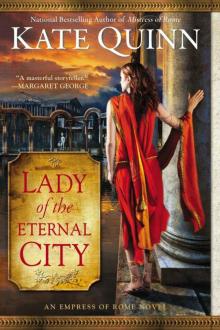 Lady of the Eternal City
Lady of the Eternal City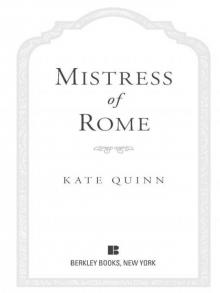 Mistress of Rome
Mistress of Rome Daughters of Rome
Daughters of Rome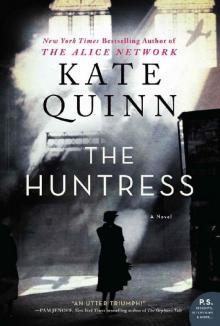 The Huntress
The Huntress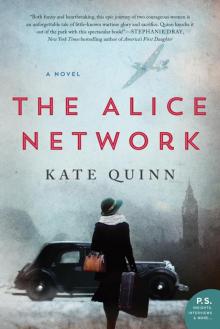 The Alice Network
The Alice Network The Lion and the Rose
The Lion and the Rose Empress of the Seven Hills
Empress of the Seven Hills The Serpent and the Pearl
The Serpent and the Pearl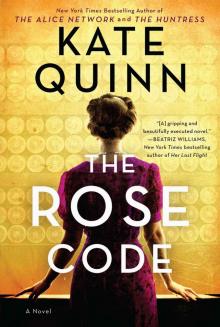 The Rose Code
The Rose Code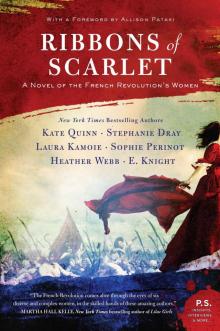 Ribbons of Scarlet
Ribbons of Scarlet A Song of War: a novel of Troy
A Song of War: a novel of Troy